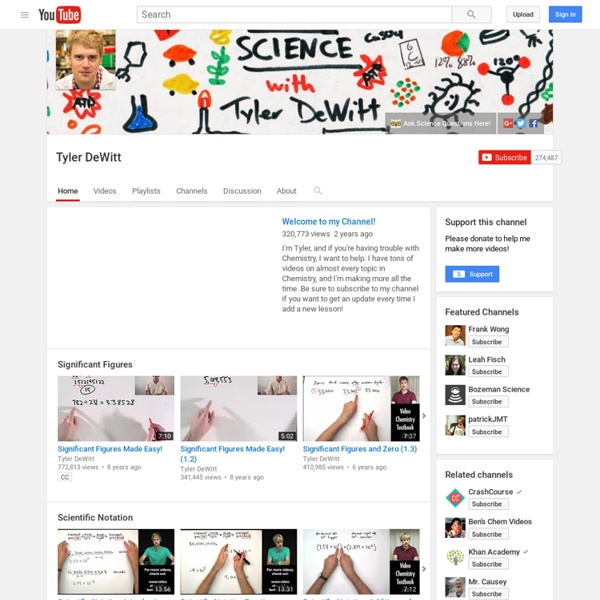



http://www.youtube.com/user/tdewitt451
Related: Kemi • quimica 1erChemCollective: Concept Tests Our concept tests use qualitative multiple choice questions to assess the understanding of key chemical concepts. (Please email us for answers and suggested classroom uses). Thermochemistry Energy and Enthalpy Thermodynamics Concept Test Concept tests that can be used as part of in-class activities to help students reason about energy and work. Equilibrium LeChatlier's Principle Chemical Equilibria Concept Test These equilibrium based concept tests can be used as part of in-class activities to help students reason about equilibrium concepts. Progress of Reaction Chemical Equilibria Concept Test These equilibrium based concept tests can be used as part of in-class activities to help students reason about equilibrium concepts. Equilibrium Calculations Chemical Equilibria Concept Test These equilibrium based concept tests can be used as part of in-class activities to help students reason about equilibrium concepts.
Misconceptions Spinning the Moon Bad Astronomy: The Moon only shows one face to us because it is not rotating. Better astronomy: The Moon only shows one face because it is rotating, once every time it revolves around the Earth. Best astronomy: The Moon does not appear to rotate in the reference frame where the Earth-Moon line is fixed in direction, but it does rotate as seen by an outside observer. Image of the Earth and Moon taken in 1994 by NASA's Galileo spacecraft, on its way to Jupiter. How it works: If you go out on several different nights and look at the Moon, you will always see the same features, at about the same position.
Chemistry Interactive Video Animations Chemistry Based Animations These animations support the teaching of concepts in chemistry in freshman through graduate level courses. Some of the QuickTime movie are without audio, and some of the audio--from a few of the sound augmented QuickTime movie--has been stripped and made available in Real Audio's streaming audio format. Conceptual Chemistry Questions The new AP Chemistry Curriculum and the NGSS both focus on developing deep conceptual understanding. In order to achieve this, teachers must identify the objectives they need to teach to and stockpile a good assortment of conceptual questions for formative and summative assessments to support those objectives. An understanding of common misconceptions related to chemistry content is also important in designing meaningful assessments.
Fears, Rules, Words, Questions « Teaching Science A quick lesson description here; I’ve been far too focused on political stuff recently. I thought I’d blogged this before, but apparently not. (And while I’m reviewing – 120 posts. Yeah, really.) How Does an Orange Peel Pop a Balloon? Chemistry, of Course! By Tom Kuntzleman, Tori Talaski and Charles Schaerer There is a new experiment circulating the web. Check it out: Isn’t that cool? The juice from an orange peel causes a balloon to pop. Conceptual Questions & Challenge Problems in Chemistry A. "Conceptual Questions and Challenge Problems in Chemistry" (web site) is part of the Journal of Chemical Education Question Bank, providing "a library of free response and multiple choice conceptual questions and challenge problems, tips for writing these questions and problems, and a discussion of types of concept questions." "This site is intended to be a means of sharing conceptual questions and challenge problems among chemical educators." 1.
Teachers TV - Schools Skip to main content GOV.UK uses cookies to make the site simpler. Find out more about cookies Ch. 8 Conceptual Questions - University Physics Volume 3 Want to cite, share, or modify this book? This book is Creative Commons Attribution License 4.0 and you must attribute OpenStax. Attribution information If you are redistributing all or part of this book in a print format, then you must include on every physical page the following attribution: Access for free at If you are redistributing all or part of this book in a digital format, then you must include on every digital page view the following attribution: Access for free at Citation information Use the information below to generate a citation. We recommend using a citation tool such as this one. Authors: Samuel J.